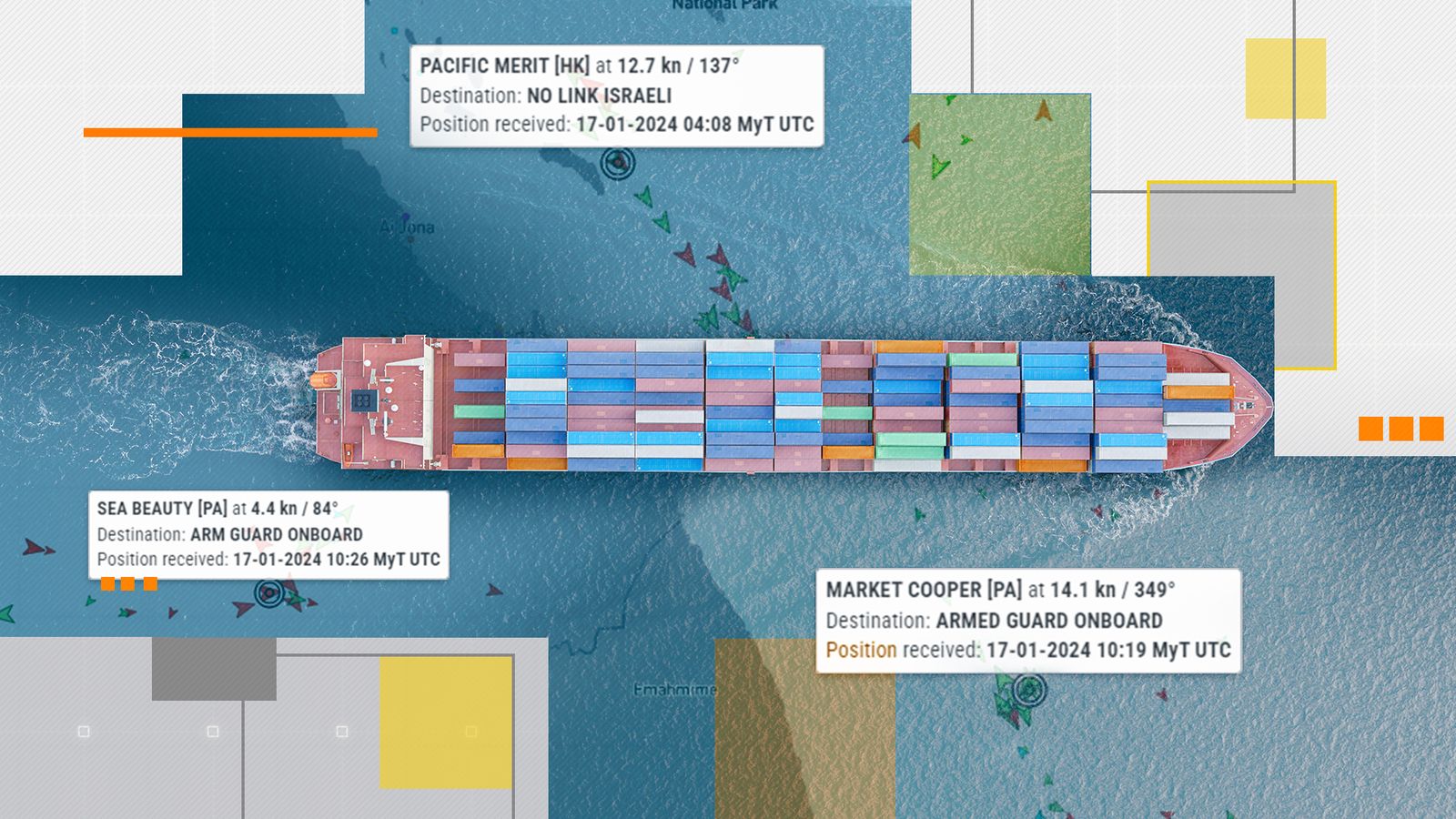‘Armed guards on board’.
‘No link to Israel’.
These are just two of the messages cargo ships passing through the Red Sea are sending out in attempts to deter a group of rebel pirates from trying to board.
Yemen’s Houthis oppose US and Israeli influence in the Middle East. To show their support for Hamas, they have been targeting commercial cargo ships travelling across one of the world’s busiest shipping lanes.
The dramatic hijacking of a cargo ship on 19 November was one of the most significant attacks, with men seen dancing on the top deck of the Galaxy Leader after they used a helicopter to seize it.
As a result, several shipping firms suspended sailings through the Red Sea, instead rerouting via the Cape of Good Hope – a journey that takes an average of 10 days longer and costs around £1.6m more.
But for ships still travelling through the area, messages are being written in place of where the ship would normally list its destination, making the messages visible across marine tracking sites.
Davos: As the rich attend World Economic Forum, there are fretful noises about what’s happening in Red Sea shipping lanes
Sunak ‘will not hesitate’ to protect UK security after Yemen airstrikes
The Week… the Post Office delivers answers
Instead of the final port, ships are displaying notes saying they have an all-Chinese crew, or in several instances, advertising the presence of armed forces.
How the Red Sea became a battleground – and what it means for UK shoppers
Among them is the Pacific Merit, owned by the China Merchants Energy Shipping Company, and managed by Sinotrans Ship Management, headquartered in Hong Kong.
After leaving the International Port of Texas on 23 December, it travelled through the Suez Canal on its way to Port Said, in the East Mediterranean.
As it entered the Gulf of Suez, at 2.48pm on 16 January, it updated its destination to read ‘No link Israeli’. It then turned off its automatic identification system (AIS) shortly before entering the Red Sea.
Christopher Parry, a former Rear Admiral and maritime risk expert, said this was often seen during the time of Somali pirate hijackings, or when ships are carrying hazardous cargo.
“It is just an information field you are allowed to put things in, but they are using it to give additional reasons for [the Houthis] to not attack them,” explained Parry.
Ultimately, he said, it might not be that much of a deterrent, although “the Houthis and the Iranians are using the AIS for targeting”.
“I think initially they did when they could identify anything remotely Israeli, but lately they have been hitting almost anything,” he said. “And that is down to incompetence.”
The ships that updated their destinations
Sky News has not been able to verify exactly how many ships have used this form of messaging, but in the last 10 days, at least 50 ships have changed their destination to deny links with Israel or highlight armed guards on board.
SEA BEAUTY
Sea Beauty, a crude oil tanker, originally had its destination listed as Singapore, but at 11.26pm on 13 January, this changed to read ‘Arm guard onboard’.
It also turned off its AIS tracking as it travelled through the Red Sea.
MARKET COOPER
Travelling the opposite way around the world, Market Cooper left the Chinese port of Lanshan on Christmas Eve. After skirting around Malaysia and Sri Lanka, at 2.56pm on 13 January it updated its destination from Suez to read ‘Armed guard onboard’. It is difficult to pinpoint exactly when this took place, because the ship also turned off its tracking system.
CAROLINE BEZENGI
The Caroline Bezengi was heading towards the Indian port of Visakhapatnam – having left Finland, it sailed around Europe and through the English Channel – when it changed its destination to read ‘No Israel connection’ at exactly 8am on 17 January. It changed to display this message just as it entered the Red Sea.
Will it work as a deterrent?
The AIS transmits a ship’s location so others are aware of its position. The International Maritime Organisation requires large vessels to broadcast their position and destination to avoid collisions.
Graham Shaw, Maritime Captain and co-owner of MUSC – a company that provides maritime risk services and advice in some of the world’s most volatile locations – said turning off the AIS entirely is not unprecedented.
“It is certainly one of the first things I would think about,” he told Sky News. “Ships do this particularly when they are involved in the dark side of transfers at sea.”






















